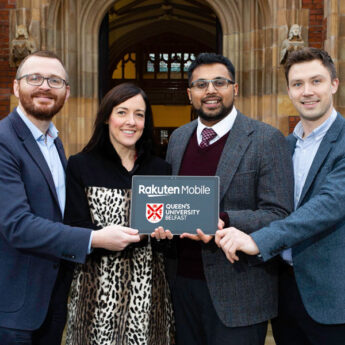The UK was the first major economy to pass laws requiring net-zero carbon emissions by 2050 when legislation was signed on 27 June, 2019. As the leader of the movement to eliminate carbon emissions by mid-century, the UK is working to encourage other governments to do the same.
 At the British Chamber of Commerce in Japan (BCCJ) Responsible Business Forum on 17 September, Sue Kinoshita, deputy head of mission at The British Embassy Tokyo, said: “We aim to ramp up ambitions right across the world towards a climate-resilient, zero-carbon economy. We want as many countries as possible to sign up to reaching net-zero emissions as soon as possible”.
At the British Chamber of Commerce in Japan (BCCJ) Responsible Business Forum on 17 September, Sue Kinoshita, deputy head of mission at The British Embassy Tokyo, said: “We aim to ramp up ambitions right across the world towards a climate-resilient, zero-carbon economy. We want as many countries as possible to sign up to reaching net-zero emissions as soon as possible”.
Japan is on board, with Prime Minister Yoshihide Suga pledging last October to hit the same target.
Mobility and clean transport are key to achieving net-zero carbon emissions and will be discussed at the 26th Conference of the Parties to the United Nations Framework Convention on Climate Change (COP26) in Glasgow, Scotland in November.
The British government believes the switch to zero-emission vehicles is essential to building a cleaner future and plans to phase out the sales of new petrol and diesel vehicles by 2030. The Tokyo Metropolitan Government announced plans on 8 December to do the same, while the Suga administration is targeting the mid-2030s nationwide.
Partner for change
Not only do electric vehicles and related technologies help eliminate air pollution, they also allow cities to provide secure transport when and where it is needed. The innovations that can help transform how we move from place to place are on display now during the Future of Mobility GREAT Season, part of the UK in JAPAN campaign jointly organised by the British Embassy Tokyo, the British Consulate-General Osaka and the British Council Japan.
Originally planned for 2019–20, the UK in JAPAN campaign—a range of events covering business, science, education, culture and the arts—was halted due to the pandemic and restarted last September.
The Future of Mobility GREAT Season kicked off on 19 October with an event entitled AI/SUM & TRAN/SUM with CEATEC 2020. Hosted by Nikkei Inc., the event focused on the intersection of artificial intelligence (AI) with transport and mobility technology. William Chernicoff, head of research and innovation at the Toyota Mobility Foundation (TMF), and Damon Wischik, a fellow at the Alan Turing Institute (ATI), presented on how AI can be used to modernise city planning and traffic management systems.
The collaboration between TMF and ATI, the UK’s national institute for AI and data science, won UK–Japan Partnership honours at the BCCJ’s 2020 British Business Awards for providing innovative and equitable solutions to some of the world’s most pressing mobility needs.
Data driven
The TMF–ATI pilot project to create what they call the Mobility Data Toolkit is an excellent example of the future of mobility. The goal is “to transition complex traffic management from static systems with limited human intervention to a dynamic, system-wide, real time-managed and optimised system across multiple travel modes”.
How do you do that? It starts with data. Through many sources, information about traffic flow is collected and then fed into an AI system that analyses the data and learns how to respond to different traffic demands. This is combined with user-choice modelling—a view of the transport decisions people make based on their needs and circumstances—to provide traffic managers with the information they need to make better choices during times of high demand and heavy congestion.
Through this partnership, ATI is bringing British expertise to the challenge of mobility in future society, and the tie-up with TMP is a shining example of UK–Japan collaboration.
Road ahead
More events are planned for the Future of Mobility GREAT Season, with online seminars to be held by the British Embassy Tokyo and the British Consulate-General Osaka in March and May. With the main themes of “clean” and “connected,” the events will introduce the UK’s efforts to build the future of mobility and highlight successful UK–Japan partnerships.
The embassy wants more Japanese firms to benefit from carrying out R&D in the UK, partnering with UK universities and other institutions such as the Advanced Propulsion Centre (APC). The APC, based in Warwick, leads on supporting R&D projects in automotive with a major focus on zero-emission vehicles.
There is a new Automotive Transformation Fund of more than £1bn. The APC will administer the fund and Japanese firms based in the UK can apply if they have high quality R&D projects connected to the zero emission theme.
Next up is the embassy’s 4 March event, which will showcase the UK’s leadership of climate change in the year of COP26. It will specifically focus on the ambitious agenda to move towards zero-emission vehicles with key milestones in 2030 and 2035. The event will be attended by leading Japanese businesses and policymakers, with keynote speakers from the British government and industry.
The UK Department for Transport has established the Centre for Connected and Autonomous Vehicles in collaboration with the Department for Business, Energy and Industrial Strategy to promote research on connected self-driving cars. More than 1,000 people are involved in design, engineering and research at the National Automotive Innovation Centre (NAIC) in Warwick. The largest such facility in Europe, NAIC is a joint venture formed by BCCJ Platinum Member Jaguar Land Rover, its parent firm Tata Motors Limited and the Warwick Manufacturing Group, a department of the University of Warwick.
Firms interested in bilateral partnership and investment opportunities to transform the future of mobility are invited to contact the Department for International Trade at the embassy or consulate.







